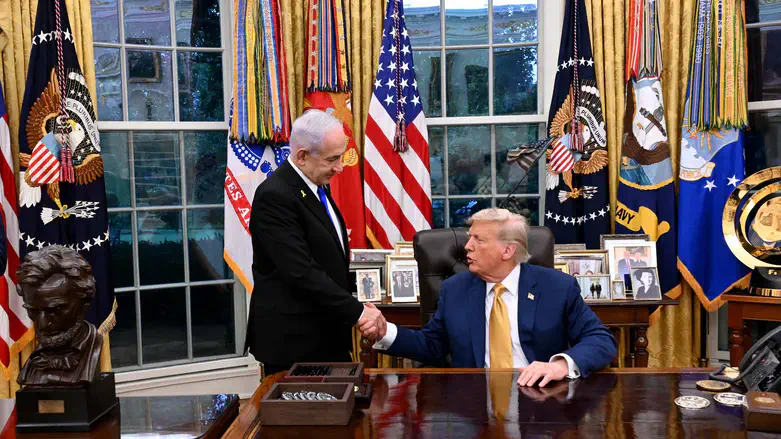
Prime Minister Benjamin Netanyahu offered a glimpse into the complexities of Israel's current conflicts and diplomatic triumphs during an interview with Mark Levin of Fox News, which aired on Saturday night.
The Prime Minister emphasized the unprecedented nature of the alliance between Israel and the United States under President Donald Trump, and provided insights into the ongoing war in Gaza and the broader regional shifts.
Netanyahu began by reiterating his nomination of Trump for the Nobel Peace Prize, citing Trump's pivotal role in brokering the Abraham Accords, which normalized relations between Israel and four Arab states. "If anyone deserves the Nobel Peace Prize, it's President Trump," Netanyahu stated, suggesting Trump's efforts could merit "maybe four Nobel Prizes for him." He also credited Trump with mediating other international conflicts, including peace between Rwanda and the Congo, and aiding in de-escalating tensions between nuclear powers India and Pakistan.
The Prime Minister highlighted the dramatic shift in regional dynamics, noting a surge in "back-channels, side-channels, open-channels, secret-channels" indicating a desire for improved relations with Israel from various nations. This newfound openness, he explained, stems from a shared belief in the doctrine of "peace through strength," with countries recognizing the importance of a strong stance against common threats, particularly Iran.
Addressing the recent strikes in Iran, Netanyahu stated that the operation was necessitated by Iran's rapid pursuit of nuclear weapons and ballistic missiles. He likened the pre-emptive strike to "taking out two lumps of cancer," stating that inaction would have led to an existential threat to Israel, a country "the size of New Jersey."
He revealed that Israel had previously delayed Iran's nuclear program for about a decade through various "disruptions," but the recent escalation required decisive action.
On Gaza, the Prime Minister condemned Hamas's tactics, describing the October 7th attack as an act of "deliberate targeting of civilians. Deliberate rape. Deliberate murder. Deliberate decapitation. And with GoPro cameras."
He contrasted Israel's efforts to avoid civilian casualties—by issuing warnings and providing humanitarian aid—with Hamas's alleged use of its own population as human shields and looting of aid. "Hamas does everything in its power to have civilian casualties," he charged, labeling their actions as "double war crimes."
Regarding the hostages, Netanyahu confirmed that 148 living and some deceased hostages have been returned out of 255 taken, with 20 alive and 30 dead still remaining. He expressed confidence in achieving the release of all remaining hostages, destroying Hamas, and ensuring Gaza no longer poses a threat to Israel.
“I intend to get all of them back. To do that, we're now negotiating a deal which would give us half the hostages, living and the dead, for 60 days as far. We're working on it. I worked on it with President Trump on this visit and I hope we get it.”
“I want as many saved. And in the process, we hope that we can get an arrangement where we can bring humanitarian aid to the civilian population without having Hamas loot it. That's what they do. They loot it, jack up the prices and use the money to recruit 14, 15 year olds to their terror army. I hope that changes. So we're working on it, but I think we'll end up meeting all our goals, achieving the release and safe return of our hostages, all of them, destroying Hamas,” added Netanyahu.
He stressed that Hamas is “not going to be there any more than the Nazi SS would be left in Germany. And ensuring that Gaza doesn't pose a threat to Israel anymore. I'm confident we'll achieve that. That's more or less the last stronghold of Iran in our neighborhood, except the Houthis. How come they're not demonstrating for the Houthis? There's no difference between the Houthis and Hamas.”
Netanyahu spoke extensively about his relationship with President Donald Trump, characterizing it as a "real partnership" marked by "mutual respect, open discussion." He stated, "We've never had a friend like him in the White House. That's an understatement." He praised Trump's directness and clear understanding of the threat posed by Iran, recalling Trump's firm stance against Iran's nuclear ambitions.
He emphasized that Trump recognized that Iran's development of nuclear weapons and long-range missiles posed a "terrible threat to the United States," not just Israel, with the potential to reach major American cities. Netanyahu highlighted the shared understanding that "our enemy is your enemy, and that our victory is your victory." He lauded the precision and force of US military support, including the use of B-2 pilots, as instrumental in the recent successes against Iran, asserting it has "projected American power and resolve around the world."
Netanyahu dismissed concerns about a wider conflict, stating that predictions of "World War III" were "folly" and "nonsense." He underscored the unprecedented "teamwork" and "no daylight between Israel and the United States" under Trump's leadership. He also noted Israel's intelligence sharing with the US, which has "saved many, many, many American lives from impending terrorism."
The Prime Minister concluded by asserting that the Iranian regime is "in deep trouble" and expressed optimism for a different future for the Middle East, one characterized by economic, technological, and energy cooperation between Israel and its Arab partners, provided Iran is kept in check. "We've won a great victory, and that can produce terrific growth," he affirmed.
